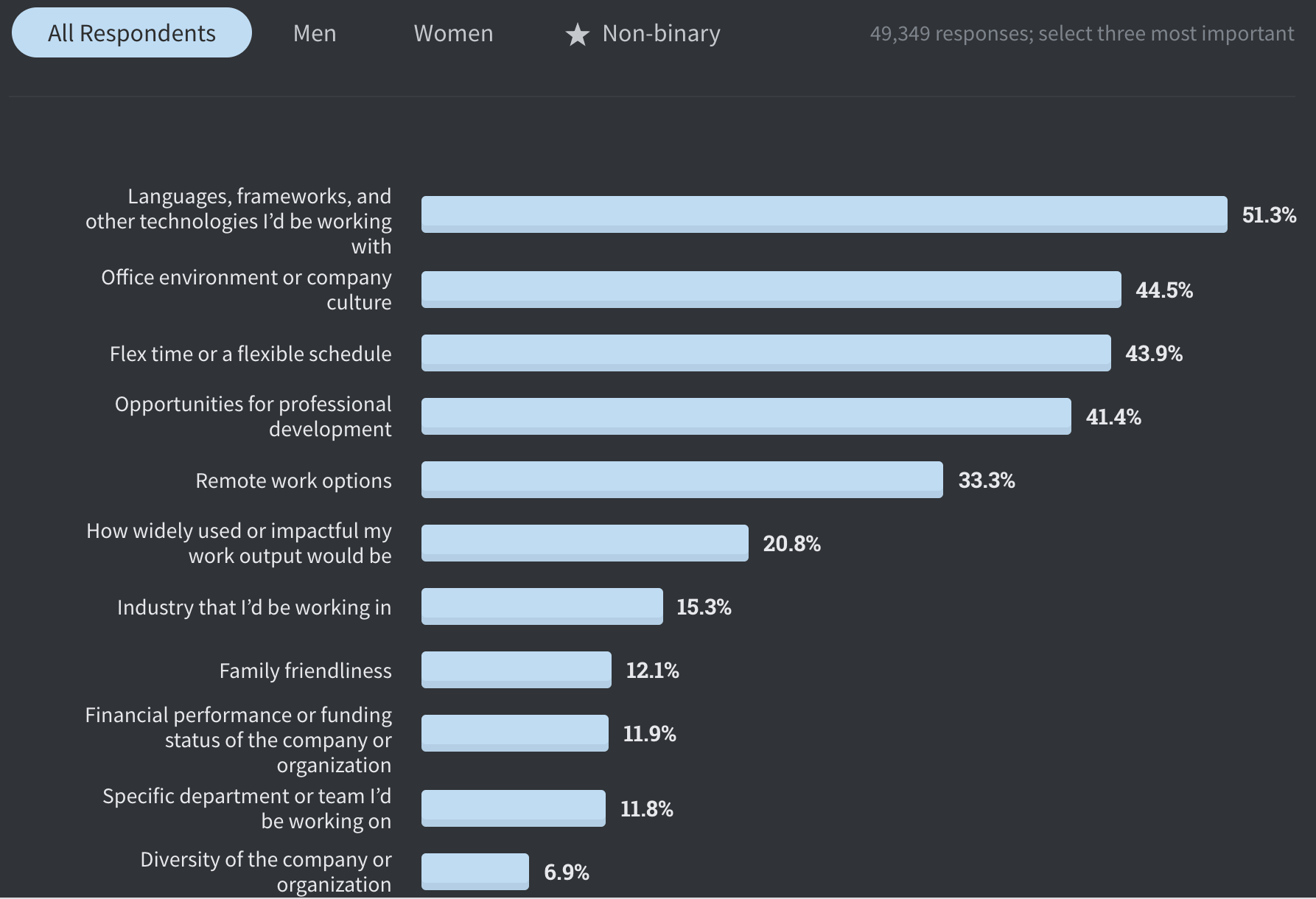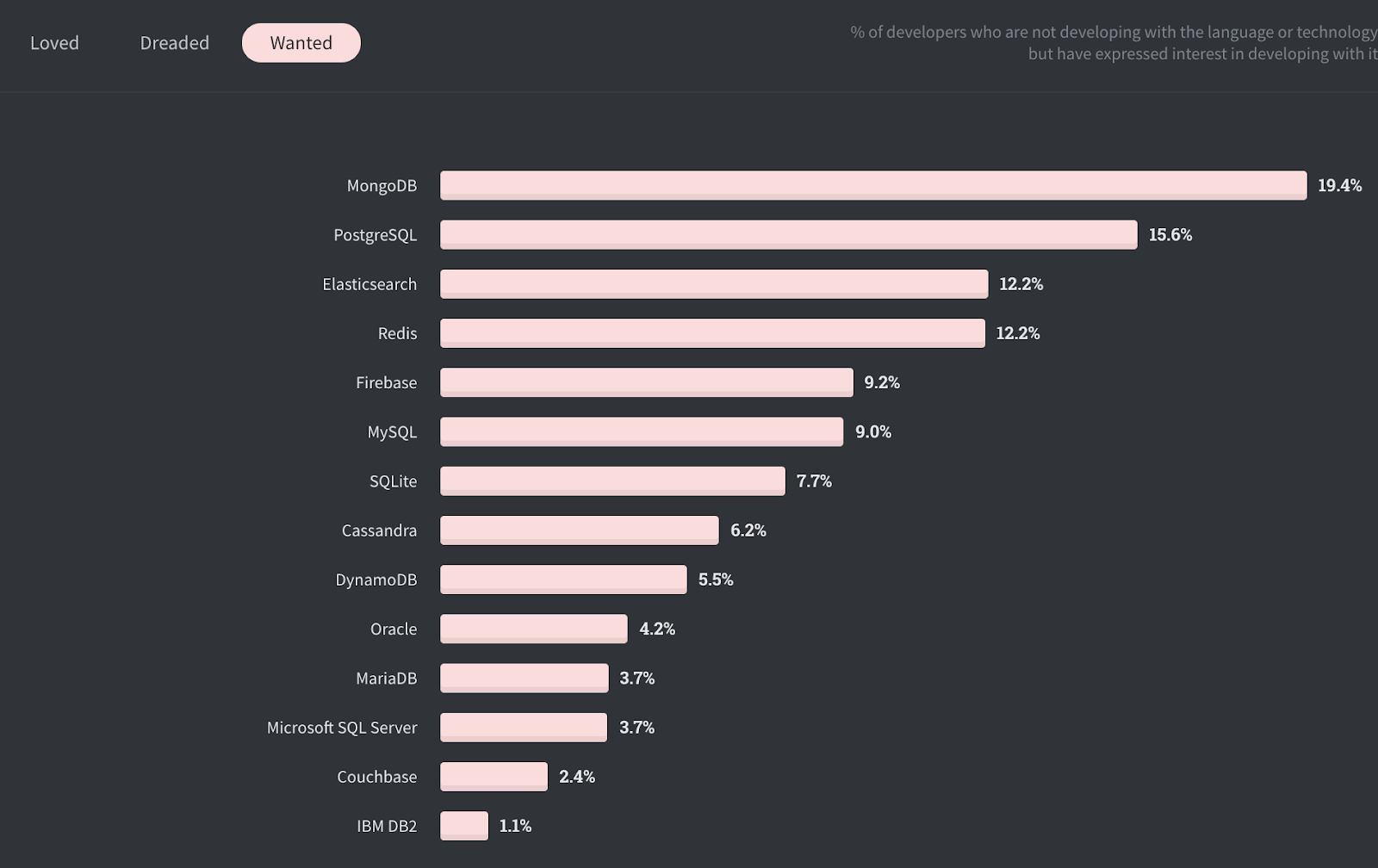Stack Overflow has just published its annual developer survey, and the results, as ever, provide compelling insights. This is also the 4th consecutive year MongoDB has been rated as the database most wanted by developers.
Why are the survey’s insights so relevant? We at MongoDB have long believed that we don’t live in a “software-defined economy” – rather its a “developer-defined economy” – where developers have a massive influence over any organization’s success. So understanding the top trends, technologies, and work priorities for software engineers is critical.
To give an indication of how important this survey is, it’s the largest of its kind anywhere in the world. The 2020 survey took the pulse of 65,000 developers from 186 countries. (As a side-note, I didn’t know there were that many countries as I haven’t been out much lately, but Google reliably informs me there are actually 195 countries on the planet).
What can we learn about database trends?
By studying the survey results, you can see what your peers rate as the top programming languages, frameworks, libraries, tools, and development platforms. But it’s databases I wanted to explore further here because there are conclusions we can make that have a direct correlation to how you attract and retain developers.
When you look at the databases most widely used by developers, 4 of the top 5 are all relational. MongoDB is the only one of the top 5 that falls into the non-relational camp. This shouldn’t be surprising. Relational databases have been around for decades, often selected as standards years ago, and are backed by a broad ecosystem of tools and skills.
- Of the top 5 most loved databases, only one relational database makes the list. All the others are non-relational.
- Of the top 5 most wanted databases, only one relational database makes the list. All the others are non-relational.
When you look at the most dreaded databases, then the story is different. 3 of the top 5 in the list are relational. The 2 non-relational systems in the top 5 “most dreaded” are both fairly niche systems, serving a narrow set of specialized apps.
What does all this tell us?
In the developer-defined economy where you are building new digital touchpoints with your customers or modernizing those creaking core backend systems, you have to give developers the technologies they want to use to get their jobs done. And those technologies mostly don’t include relational databases.
Developers are under increasing pressure to compress engineering cycle times and continuously integrate new business functionality. They have to work with much more than flat, tabular data structures. And they need to distribute their data for performance, scale, resilience, and sovereignty. Of course, you can do many of these things with traditional relational databases. It just costs you a lot more time and money.
Why is all this so important in a developer-defined economy? As the survey shows, beyond compensation the most important job priority for developers is the technologies they get to work with day in, day out. And for those hunting for a new job, then working with new technologies is the most important factor after salary.

Most wanted for 4 years
Stack Overflow created the database-specific category back in 2017, and MongoDB was rated as the most wanted then. It was top again in 2018 and 2019 and now repeats the ranking for the fourth consecutive year.

What do we make of these results?
Firstly, we want to express our gratitude to all of those developers who took the time to complete the survey.
We are truly humbled by the MongoDB community that makes the database better every day, innovating on some of the most demanding applications anywhere, guiding our roadmap, telling us what they do and don’t like, and educating others on how to get the most out of MongoDB.
Why do developers select MongoDB today, and why do so many others want to start using it? We believe it is because MongoDB enables them to build faster, and better meet the demands of modern applications through three core design principles.
- The document data model and MongoDB Query Language, giving developers the fastest way to innovate in building transactional, operational, and analytical applications.
- The fully managed MongoDB Atlas global database service, giving developers the foundation to run applications on a distributed, elastic, and resilient data layer. They can choose to deploy on AWS, Azure, or Google Cloud and have the freedom to move across each as requirements evolve – without having to change a single line of code.
- The MongoDB Data Platform, providing a unified developer experience for modern applications that span cloud to edge, in database, search, and the data lake, backed by comprehensive & integrated developer services.
Getting Started: There’s No Time Like the Present
The Stack Overflow survey tells us that 75% of you like to learn a new language or technology at least once a year and that 77% of you start out with a free trial.
So what better time to spin up a fully-managed MongoDB Atlas cluster on our free tier? No credit-card, and it’s free forever.
You can check out our MongoDB Quick Start guides to begin developing against MongoDB in your favorite programming language. If you want a more curated learning path, then register for MongoDB University which provides no-cost, web-based training on the basics of MongoDB, and covers data modeling through building your first application using the most popular languages.
Want to learn what’s coming next for the database most wanted by developers? Join us at MongoDB .Live on June 9th and 10th. Like all the best conferences these days, it’s virtual...and yes, it's free! So wherever you are in the world’s 195 countries, you will be among the first to see what’s next for MongoDB.